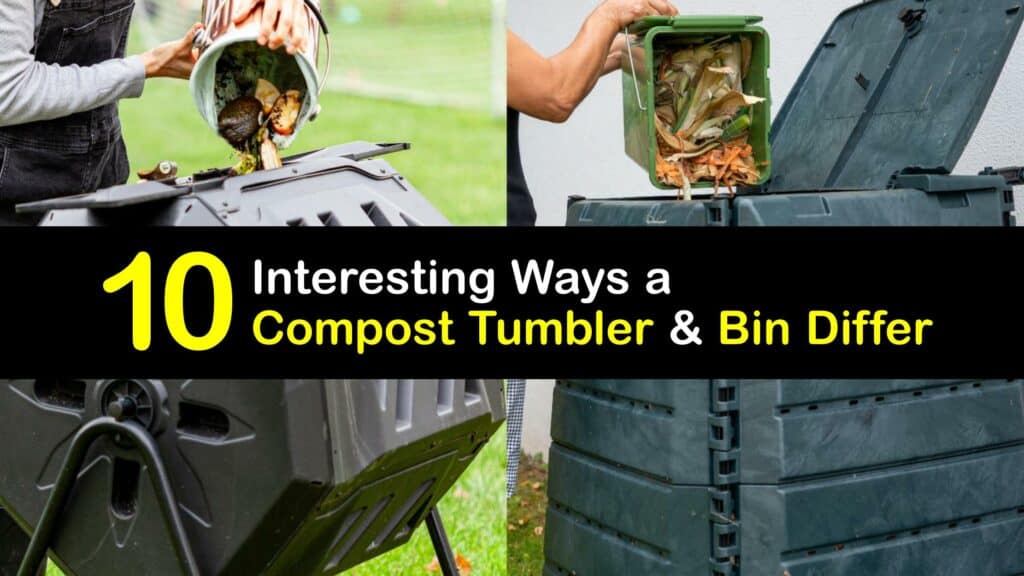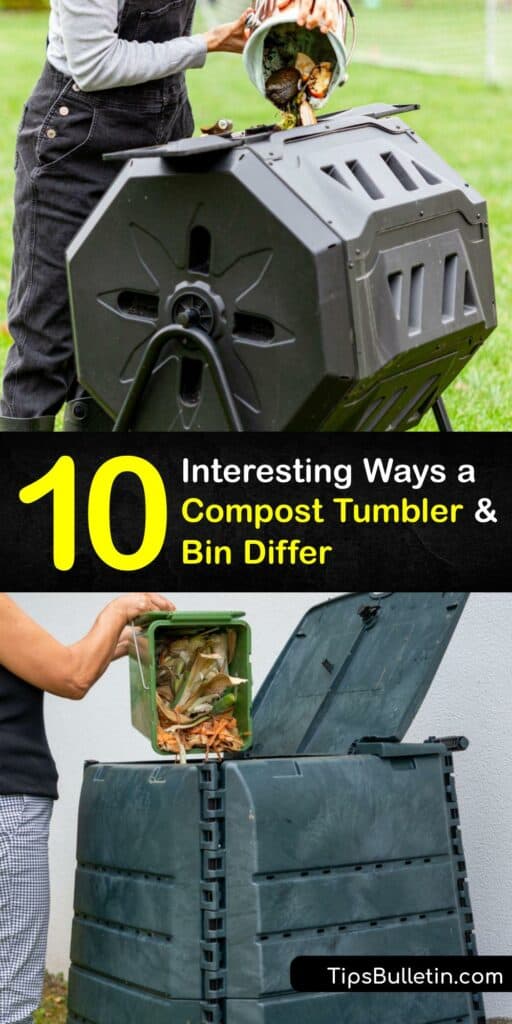Discover the pros and cons of a compost tumbler vs bin, and learn which option is ideal for your home composting operation. Composting is a responsible way to dispose of your kitchen scraps, paper products, and yard waste without using landfills. A regular or rotating compost bin helps to establish the optimal environment for the breakdown of organic matter into finished compost.
Finished compost is an organic and natural fertilizer rich in nutrients. Plants fed with finished compost grow bigger, produce more flowers and fruit, and are generally healthier. Before investing, discover the composting pros and cons with a bin or a tumbler.
A compost bin is a simple structure and is painless to construct or upcycle. Compost bins require you to manually turn the compost to aerate the mixture and assist the beneficial microbes responsible for decomposition. A compost tumbler has a rotary system with a handle or pullies, making it effortless to tumble the contents of the container for aeration.

- Bin or Tumbler – Composting Pros and Cons
- What is Composting?
- The Advantages of a Compost Tumbler vs Bin
- What is a Compost Bin?
- A Tumbler is a Rotating Compost Bin
- How Does Composting in a Vessel Differ from a Compost Heap?
- What Materials Go in a Compost Tumbler or Bin?
- The Best Composter to Construct at Home
- Choosing a Composting Bin or Tumbler for Your Home
- Other Composting Methods
- Composting Pros and Cons
Bin or Tumbler – Composting Pros and Cons
Discover everything you need to know to start home composting using a bin or a tumbling composter. Explore the differences between a compost tumbler vs bin to figure out which is best for your situation.
A rotating compost bin makes for easy turning and is brilliant for people who prefer not to be hands-on with their composting material. A compost bin is a tried and true form of composting and is simple to construct at home or buy in a range of shapes and sizes.
What is Composting?
Composting is an environmentally friendly technique to manage food leftovers and garbage. When food waste is placed in a compost bin or tumbler, it is repurposed to feed plants rather than thrown into a landfill. Disposing of yard debris such as leaf litter, plant clippings, and twigs is easier when you have a compost pile.
Composting is a simple at-home approach for decomposing organic waste, such as leftover vegetables and fruits, yard clippings, and paper, into a nutrient-rich substrate to be used as a soil supplement for your garden or container plants.
The result of the decomposition of organic waste in the composting process is finished compost – an organic fertilizer that often resembles a dark or black powder like dirt.

The Advantages of a Compost Tumbler vs Bin
Composting is a straightforward process, though its ease relies heavily on having an appropriate setup for the amount of waste material you produce and your space. Understanding the differences and advantages of a bin and tumbler helps you make the best decision for your family.
The wrong size bin or tumbler could be a disaster for your compost. A too-large vessel leads to your compost having too little volume to fill the space, making it impossible to heat up for an efficient breakdown. A too-small vessel could leave you with a backlog of kitchen waste.
If you struggle to turn waste with a shovel, a compost tumbler is a superior option to ensure your system stays aerated. A bin is generally cheaper to buy or build if you can turn your compost manually. Consider the differences between a bin and a tumbler before setting up your composter.
What is a Compost Bin?
A compost bin is a container or vessel which encloses your compost system. Bins are made from many materials, from wood and metal to recycled plastic. A bin protects your composting system from the elements and keeps pests from digging through your compost.
Compost heaps may spread and take over a large area and become unsightly. A composting bin contains everything and may be painted or designed to fit your outdoor space aesthetic.
A Tumbler is a Rotating Compost Bin
A compost tumbler makes turning compost a breeze. Composting tumblers are very similar to bins. A tumbler is an enclosed structure with a hatch or lid that opens to put your green waste for composting inside. Tumblers have a handle or a pulley system to rotate the entire container to aerate the materials inside.
Compost tumblers come in several sizes, from tiny countertop compost turners to large outdoor structures. Consider a compost turner if you have a physical limitation that makes shovelling compost hard or prefer not to turn decomposing materials manually.
How Does Composting in a Vessel Differ from a Compost Heap?
Using a regular or tumbler compost bin differs from having a compost pile in your yard. Both a tumbler and bin are self-contained structures with a hatch or lid for you to add organic waste.
A compost pile is open to the elements and at risk of being dug through by pests searching for a quick meal. When you set up a compost bin or tumbler, you process more waste with a smaller footprint as the container stops your composting system from spreading and helps it heat up.
What Materials Go in a Compost Tumbler or Bin?
Organic material suitable for composting is separated into two groups: brown waste and green waste. You can also start adding shredded paper to a home compost bin and other organic paper products. Brown waste is high in carbon and dry, branches and brown grass clippings. Green waste is abundant in nitrogen and damp, such as vegetable peels and green yard clippings.
You should also know what not to put in your compost tumbler at home. Most people refrain from composting meat and animal products due to the increased risk of pathogens. Do not pack composting in plastic bags, as these prevent decomposition.
The Best Composter to Construct at Home
If you’ve decided to craft a composting tumbler or bin to break down composting material in your backyard, you may wonder which is easier to construct. In general, a bin is more straightforward to build. Smoothly recycle old containers into compost bins or erect a simple structure using scrap wood and supplies.
It is possible to create a DIY compost tumbler, though this requires more technical planning to account for a way to rotate the vessel. Plan any project before beginning, and always take appropriate safety precautions while working on your homemade compost tumbler or bin.
Choosing a Composting Bin or Tumbler for Your Home
If you’re ready to convert organic matter to usable compost, it’s time to select the best compost tumbler or bin. Whether you want to recycle a small amount of kitchen scrap material or try hot composting on a larger scale, the appropriate tumbling composter or bin is vital.
Consider the amount of organic waste your family generates, how much finished compost you can use or gift to your family and neighbors realistically, and how much of your yard, home, or patio space you’re willing to allocate to composting.
If you’re in an apartment with limited space, a compact compost tumbler is the most appropriate, whereas a bin is a more practical solution if you have a large yard and lots of waste.
Other Composting Methods
If a bin or tumbler doesn’t seem right, consider a different idea to make composting work for you.
Vermicomposting is a unique procedure for breaking down organic waste. Redworms live inside your worm bin and assist in the decay and degradation of your kitchen scraps to generate finished compost quicker than other approaches. While worm bins require more care than other methods, they make composting a larger volume of organic matter accessible to those in tiny and indoor spaces.
If you’re on a budget, a compost pile is a fantastic way to start composting. Dig a shallow hole, and you’re ready to add your composting materials. If you’re unsure if composting is for you or if you have ample outdoor space and lots of waste, give a compost heap a try.
The green cone composter is a unique compost bin that uses solar energy to speed up the composting process. While the bin is an initial investment, it may be appropriate for families with lots of organic material who don’t want a traditional bin or to devote a large space to composting.
Composting Pros and Cons
Composting has many benefits to the individual and the environment. Using a hot compost technique to decompose organic matter into finished compost quickly cuts down on food waste. Use the resulting compost as is or make it into compost tea to enrich your garden soil and stimulate the growth and health of your plants.
Whether you grow a few houseplants or have a vast garden of food and flowers, this rich compost is free and organic, making it an excellent tool. Composting your garden waste is often simpler than burning or arranging another disposal strategy.
There are few composting cons. The initial setup takes some time and thought, yet established compost systems require little maintenance to be productive. You will also need to avoid flies living in your compost bin and tumbler by keeping the compost free from spoiled meats and rotating often.
A compost bin and tumbler have a few key differences which make them uniquely suited for different situations. Once you understand the composting pros and cons, you’ll be eager to start your own home composter to turn your organic waste into rich nutritious compost for your garden.
Choose a compost bin or tumbler to suit your requirements and easily dispose of yard waste and kitchen scraps to make valuable finished compost.

If you loved this article on a compost tumbler vs bin, please share this brilliant information on a rotating compost bin with your friends and family on Pinterest and Facebook.